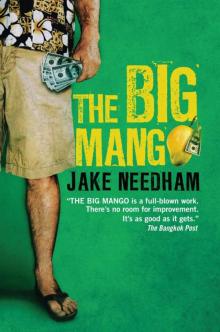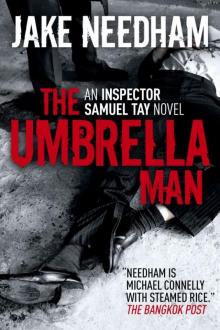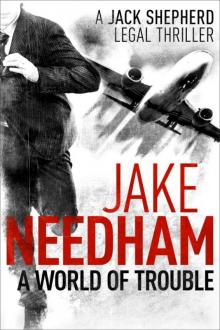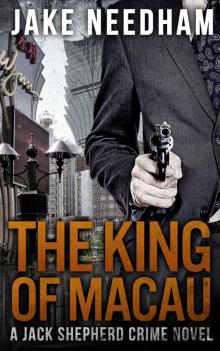- Home
- Needham, Jake
Umbrella Man (9786167611204) Page 11
Umbrella Man (9786167611204) Read online
Page 11
This time he turned the opposite way, went all the way to the end of the hall, and entered a small bedroom in the back of the house he didn’t think he had been in for years. He flipped on the light and was pleased to see the room was neat and clean. His housekeeper, an elderly woman from Indonesia, was almost as obsessive as he was and had obviously been cleaning the room religiously whether he went into it or not.
The room had been used for storage for as long as he could remember, probably even back when his father had been alive and he had been a child and they had all lived in this house like a normal family. Well…normal might be overdoing it a bit, but this was hardly the time to dig up those bones.
Now the room looked like a used furniture store, if there was any such thing as a used furniture store anymore. Chairs, upholstered and plain; cabinets of various description; at least half a dozen tables; lamps, mostly with ceramic bases, sitting on every flat surface; and over against one wall, the two black steamer trunks banded in bronze metal strips that Tay remembered.
Tay put his coffee mug on a small mahogany table against the wall, pulled up a straight chair, and then opened the lid of the first trunk. It took him a while to work his way through it, but when he had finished he had found nothing but women’s clothing. It all belonged to his mother, he presumed. Still, none of it looked familiar, but then he couldn’t describe what Dr. Hoi was wearing when he saw her two days before so he guessed it was pretty obvious he wouldn’t recognize clothes his mother wore several decades ago.
Had he been wrong about the photographs? He piled the clothes back into the trunk, closed the lid, and sat on the straight chair for a minute sipping his coffee which was now lukewarm. No, he was sure he wasn’t wrong. The photographs were either in the other truck or they were somewhere else in this room. He was sure of it.
***
He put down his coffee mug and opened the second trunk, and he saw immediately that it was filled with things that had belonged to his father. There were some clothes, but most of the space was taken up with stacks of ledger books, piles of neatly labeled file folders, and — right there on top, underneath a double-breasted blue blazer folded in half — two green leather photo albums.
Tay lifted the two albums out, sat back down in the straight chair, and piled them on his lap. When he opened the cover of the first one, he saw neatly mounted on each page rows of postcard-sized photographs of people at an office. The color photos were faded, some of the ones that looked like old-fashioned Polaroids were even too dim to make out, but the black and whites were crisp and clear.
Tay popped one photo out of its mounts and turned it over. Sure enough, he found exactly what he was hoping for. Someone had written a date on the back of the photograph in pencil, and beneath it were four names.
As soon as he saw the writing on the back of the photograph, it gave him another idea. He put the albums on the floor and picked up one of the ledger books at random. When he opened it, he found page after page of hand-written accounts, although he had no idea what they were accounts for. He flipped slowly through the book’s pages, skimming each of them quickly, and about a dozen pages in he found exactly what he was looking for.
DST.
The initials were penciled in the margin next to a column of figures that had been totaled.
DST.
His father’s initials.
Tay had no idea what the accounts were or why his father’s initials were on them, but that wasn’t the point.
What really mattered was the handwriting looked exactly the same as the initials he had found on the ledger sheets in the HSBC safety box. If Tay still had any doubt there was some connection between the dead man and his father, he had it no longer. He just didn’t have the first idea what that connection could possibly be.
***
Tay opened one of the photo albums and leafed through it. There must have been forty or fifty photographs in all. His father was in several, but most were of people he didn’t know doing things that didn’t look very interesting. They had all been taken in what looked to be the same office and they were all images of people working at desks or drinking coffee from big ceramic mugs. The subjects were mostly men, but there were a few women, too. Judging by the mode of dress and the haircuts, Tay guessed the photos had all been made in the late sixties or early seventies, but he couldn’t be sure. He assumed the office was his father’s office there in Singapore, but he couldn’t be certain of that either.
The very ordinariness of the photographs made him wonder. Why would anyone have taken them? And why would his father have kept them at all, let alone mounted neatly and with such obvious care in an expensive leather photo album.
He laid the first album on the floor and picked up the second. The photographs in the second album were entirely different. The first one even looked somewhat official. In it, his father and three other men were formally posed in somebody’s office standing next to an American flag hanging from a staff set in a heavy-looking metal base. What kind of an office had an American flag in it? Then Tay remembered his meeting with the American ambassador at the embassy in Singapore. The ambassador’s desk had been flanked with an American flag on one side and some other kind of flag he didn’t recognize on the other, so an ambassador’s office was certainly one possibility. No doubt, Tay reminded himself, there were a lot of other possibilities as well.
The rest of the photos had mostly been taken outdoors somewhere. While the place looked Asian, Tay did not think it was Singapore. Most of the photographs were of his father, and in many of those he was with a stunningly beautiful girl who looked to be not more than twenty. She was clearly Asian, perhaps Laotian or Vietnamese, Tay guessed. In every photograph the woman was simply but elegantly dressed in western clothes.
The attachment between this girl and his father was plain to Tay. As he turned the pages of the album, he could not help but wonder if his mother had seen these photographs. Of course she had seen them, he reminded himself. How else would these albums have gotten into the trunk?
Tay had a feeling that all the pictures had been made in Vietnam, although he couldn’t put his finger on the specific reason he thought so. From his father’s age and appearance, he would guess they had been take about 1974 or 1975, right before his father had his heart attack. Could the office with the flag be the office of the American Ambassador to Vietnam? Tay went back and examined that photograph again. He had read several photo histories of the Vietnam War and, although he couldn’t remember the name of the American ambassador right off the top of his head, he thought he would recognize him if he saw him. He was pretty sure none of the people in the photograph with his father was the American Ambassador to Vietnam during that period.
Besides, what would his father be doing posing with the American Ambassador to Vietnam in the years right before Saigon fell? His father wasn’t a diplomat or a soldier. His father was just an accountant. Unless the Americans hoped to bury the North Vietnamese in ledger sheets, he didn’t see what use they would have for his father.
Tay was still thinking about that, and still feeling a certain amount of embarrassment knowing what his mother must have felt when she saw the photos of his father with this very young woman, when he came to the final page of the album and the world tilted sideways.
***
The last page held a single black-and-white photograph, a 5x7 print mounted in four white photo corners. There were three young men in the shot standing against what looked like a concrete wall. At the far left edge of the photograph was what might have been the beginning of a gate constructed of metal bars set close together. All three men were dressed plainly in dark slacks and light-colored, short-sleeved shirts. Their arms where looped informally around each other in the way friends did when they posed together for photographs. None of that was remarkable.
What was remarkable was that Tay recognized two of the men immediately.
The first man he recognized was the one on the right side of the phot
ograph. It was his father.
Tay knew his memories of his father’s appearance were not really his own. He had been far too young when his father died to have many memories of anything and so many years had passed since then that the few he had were dimmed like old photographs from which decades of sunlight had bleached out all the color and detail.
He knew he recognized his father at all only because seeing him in other photographs had created the illusion of memory. And it was in that illusion where Tay found the only real knowledge of his father that he realized he would ever have. With that thought, a wave of sadness washed over Tay and he sat and waited for it to pass. Then he turned his attention to the second man he recognized, the man in the center of the photograph.
It was the dead man from the Woodlands.
Thirty or thirty-five years younger and forty pounds lighter, but it was the man whose body they had found in that shabby Woodlands apartment. Tay had no doubt about it.
He didn’t recognize the third man, the one on the left, so he pulled the photograph from its mounts and turned it over. To his disappointment, there was nothing on the back.
Tay turned the photograph over again and studied the third man once more. Had he ever seen him before? No, Tay didn’t think he had.
The man was very tall and slightly stooped. He wore very dark aviator-shaped sunglasses with metal frames and his dark hair was trimmed very short, so short he looked almost military and, for all Tay knew, he was. Like his father, the third man had one arm looped familiarly around the shoulders of the dead man from the Woodlands. But where his father’s free arm was lifted in a sort of half wave at the camera, the other man’s free hand held an umbrella.
The umbrella was open and the man’s arm was extended above his head and across his body so that the umbrella appeared to shelter both him and the man from the Woodlands. Yet he was wearing sunglasses, and it wasn’t raining.
Perhaps the man holding an open umbrella on a sunny day was the source of the hilarity that was responsible for the broad grins all three men were sporting.
But what was the joke?
And, more important, who in the world was the umbrella man?
***
Three hours later, when the rest of Singapore was only beginning to wake to the new day, Tay had finished his task.
He had taken both albums downstairs to his kitchen table and drunk more coffee while he carefully examined every photo in both of them. Tay had searched each face in every photograph, staring long and hard at each until he was sure, but he found no further trace of either his corpse from the Woodlands or the umbrella man. Their only appearance in his father’s memories seemed to be that single 5x7 print mounted on the final page of the album.
When Tay found names written on the back of any of the photographs, he jotted them on a pad. Most of those from the office had names on the back, but almost none from the Asian location did. In particular, the backs of photographs in which his father posed with the beautiful young woman about whom Tay was now very curious were all frustratingly blank.
Tay looked at his pad and reviewed the sixteen names he had accumulated. None of them meant anything to him, but he hadn’t expected them to. He had been only twelve when his father died. He couldn’t remember anyone his father knew or had worked with.
Tay did remember going to his father’s office a few times. It had been in a white shophouse with green iron balconies that was down at the end of a narrow alley just off of Bugis Street. That had once been a notorious part of Singapore, world famous for the transvestite prostitutes who strutted their wares up and down the sidewalks every evening, but both his father’s office and Bugis Street itself had long ago been bulldozed by the faceless men who struggled tirelessly to bury Singapore’s past and construct on its ruins a fully sanitized future.
Tay went to the sink and rinsed out both his mug and the coffee pot. Then he ripped the page with the list of names off the pad and went upstairs to take a shower.
It was time to get to the Cantonment Complex. He had a lot to do.
TWENTY
TAY HADN’T EVEN been in his office long enough to throw away the accumulated flood of junk — The featured lunch in the cafeteria today is chicken rice! — when his door opened a few inches and Sergeant Kang’s head appeared.
“Have a minute, sir?”
“You’ve got an ID on the Woodlands body?”
“Uh…no, sir. No ID.” Kang hesitated. “There’s something else I need to talk to you about.”
Kang looked uneasy, which tickled Tay’s curiosity so he waved him into a chair.
“What’s on your mind?”
“That’s what I really wanted to ask you, sir.”
Tay thought about that for a moment. “You wanted to ask me what’s on your mind?”
“No, sir, I want to know what’s on your mind. Something’s going on that you’re not telling me.”
Suddenly Tay was glad his desk was covered with a fresh accumulation of paper because fiddling with it gave him something to do while he was trying to decide how to answer Kang.
If he had been at home, he would have lit a cigarette, of course. The whole ritual was generally good for a solid minute or more of downtime when he was stuck for what to say. But even Tay wasn’t enough of a social misfit to contemplate lighting a cigarette in the Cantonment Complex. He wasn’t certain what would happen if he did, but he wouldn’t have been surprised if the prime minister showed up personally and threw a bucket of water over him, then confiscated his passport and exiled him to Indonesia. Assuming Indonesia would have him.
“What do you mean?” Tay eventually asked Kang when he ran out of pieces of paper to move around his desk.
Kang didn’t even dignify that with a response. He just sat and looked at Tay and waited for him to say something that wasn’t completely stupid.
So Tay tried again.
“Look, I’m sorry if I’ve been hard to get along with recently, Robbie. I know everyone is under a lot of stress, but being cut out of the bombing investigation has been hard on me and—”
“Sir, I’m not a moron. You know perfectly well that’s not what I’m talking about. Ever since we walked into that apartment and you saw that man’s body lying on the floor, you’ve been keeping something from me. You acted like you knew who he was right off, but you’ve still got me running around like an idiot trying to identify him.”
“I don’t know who he is.”
“You may not know exactly, but you know something about him. What is it, sir? What is it you don’t trust me enough to tell me?”
Tay leaned back in his chair and knitted his hands together behind his neck.
“It’s not a matter of trust, Robbie, it’s…”
But then Tay realized it probably was a matter of trust, at least of a sort, and he trailed away into a slightly embarrassed silence.
“You’ve never really trusted me, have you, sir? Even when you were on your own and needed help and I got it for you. Danny Ong, Sergeant Lee, and I worked half the night on our own time, week after week, until you apparently had what you wanted. But you didn’t trust us enough to tell us what you did with what we found.”
A year or so back, Tay had been trying to find the killer of an American woman whose body had been found in a suite at the Singapore Marriott. But he had run into a wall. Neither his bosses in CID nor the Americans seemed to want him to succeed. He had gone behind their backs and done it anyway, and Sergeant Kang and two other cops who were friends of Kang’s had done the legwork. He would never have pulled it off without them.
“I couldn’t tell you, Robbie. I couldn’t tell anyone.”
“Yes, you could have, sir. You could have if you wanted to, but—”
“So what are you asking me for now? A confession?”
“I guess what I’m asking, sir, is—”
“When people confess to you, Robbie, sometimes they tell you things you don’t really want to know.”
“Then you�
��re saying I’m good enough to do the grunt work, but not important enough to be in on the finish?”
“Oh, for Christ’s sake, Robbie, let it go. They almost got away with what they did to that poor woman, but because of what you did they got the punishment they deserved. Believe me, that’s all you want to know.”
“We worked eighteen hour days to help you, sir,” Kang repeated doggedly. “And when you had what you wanted, you shut us out.”
Most of the time Tay wished he didn’t have to ask for help from anyone, but that simply wasn’t possible. Except in the movies, Tay knew lone wolves didn’t solve cases. Blinding flashes of insight did occur, Tay had had quite a few in his career, but mostly police work was dogged and detailed. It took manpower to get almost anything done.
“Do you ever wonder what makes people like us do what we do, sir?”
“I’ve wondered about very little else for twenty years now.”
“It’s because we believe what we do matters. Because we believe the law matters.”
“I used to believe that, but I don’t anymore.”
Kang couldn’t keep the surprise and puzzlement out of his voice. “You don’t, sir?”
“Last year I found out something about myself that changed a lot of things.”
Tay reached out and picked up a stack of inter-office memos and moved them carefully from the left side of his desk to the right.
“I found out I care about the law a lot less than I thought. But I care about justice a lot more than I thought.”
“I don’t know what you mean, sir.”
“That’s okay, Robbie. Sometimes I don’t either.”
***
A silence fell after that. It was a companionable silence, and Tay found something lurking in it that he liked quite a lot.

 Big Mango (9786167611037)
Big Mango (9786167611037) Umbrella Man (9786167611204)
Umbrella Man (9786167611204) World of Trouble (9786167611136)
World of Trouble (9786167611136) THE KING OF MACAU (The Jack Shepherd International Crime Novels)
THE KING OF MACAU (The Jack Shepherd International Crime Novels)